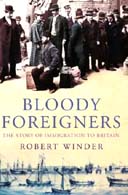
By the end of the 16th century, economic migrants were almost commonplace in Britain, if not exactly welcome. More than a third of the 7,143 "strangers" quizzed in 1573 (in one of several nervous surveys of "aliens" conducted by Elizabethans) said that they had come to these shores "onlie to seeke woorck for theire livinge".
As with the Jewish moneylenders of an earlier age, the "aliens" found themselves hedged about by new restrictions and impositions. In 1440, they became liable for a new "stranger" subsidy of 16 shillings: some 2,000 names appear on the roll of those expected to pay it. In 1453, this became an annual tax of 40 shillings. And there were repeated "race" riots, mainly in London. Two anti-Italian uprisings in 1456 and 1457 caused most of the Venetian, Genoese and Florentine merchants to lose heart and leave. And in 1517 - on what became known as Ill May Day - a London mob embarked on an energetic witch-hunt for aliens. Royal troops suppressed the riots, but the crown then introduced a new set of statutes by which denizens became liable for a new alien tax - at roughly double the normal rate.
Such anti-foreign backlashes look familiar enough, but in the context of the persecution of Protestants on the continent, it begins to appear moderate. England might not have been perfect, but it was the safest haven in Europe. There were tremors, but no pogroms.
So, despite the persistent sense of unease and occasional bouts of violence that surrounded England's immigrants, the trickle slowly became a flood. In 1500, there were 3,000 foreigners in London, 6% of the civic population. "Tottenham," said one alarmed Londoner in Henry VIII's reign, "has turned French." (Today, perhaps, that would be more likely to be said of Arsenal.)
As always, there were signs of a split in English society. Even as feelings against the recent "swarme" were growing heated at street level, forcing the authorities to get tough, employers were keen to safeguard their precious foreign craftsmen. The moral argument also made its first appearance at this time. "They are strangers now," said Sir John Woolley, pleading in a groundbreaking parliamentary debate that people should look on the bright side of immigration. "We may be strangers hereafter. So let us do as we would be done to."
· This is an edited extract from Bloody Foreigners: The Story of Immigration to Britain, by Robert Winder, published by Little, Brown, price £20, on May 20.

